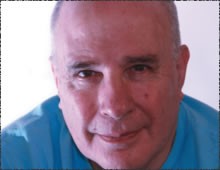 Many authors start down the publishing road believing that printing books is the same as printing money, only to be disappointed by low returns and the amount of work involved. This guest article by novelist, poet and songwriter Richard Geller responds to advice offered by marketing luminary Seth Godin who suggests indie publishers should lower their expectations. Geller proposes different ways to measure success. Printing books is not the same as printing money, but for creative writers, printing books may give rise to something of even greater value. Changing expectations and lowering them are two different things.
Many authors start down the publishing road believing that printing books is the same as printing money, only to be disappointed by low returns and the amount of work involved. This guest article by novelist, poet and songwriter Richard Geller responds to advice offered by marketing luminary Seth Godin who suggests indie publishers should lower their expectations. Geller proposes different ways to measure success. Printing books is not the same as printing money, but for creative writers, printing books may give rise to something of even greater value. Changing expectations and lowering them are two different things.
In his insightful blog, Seth Godin offers two separate lists of marketing tips for writers. I want to reflect a bit on what he has in the number-one position on each list; they’re closely related:
1. Lower your expectations. The happiest authors are the ones that don’t expect much. (2005)
1. Please understand that book publishing is an organized hobby, not a business. The return on equity and return on time for authors and for publishers is horrendous. If you’re doing it for the money, you’re going to be disappointed.
On the other hand, a book gives you leverage to spread an idea and a brand far and wide. There’s a worldview that’s quite common that says that people who write books know what they are talking about and that a book confers some sort of authority. (2006)
Any comparison of the number of books published versus the number of authors making useful amounts of money at it is damn sobering stuff. Seth Godin certainly has his facts straight. The odds are definitely against you achieving anything that resembles business success.
I have, however, a question about lowering our expectations. Does the unlikelihood of ever realizing material success or fame from your writing mean you should lower your expectations? Or should you, instead, adopt different sets of expectations—aligned with marketplace realities—that are high nonetheless?
I have a lot of respect for Seth Godin, especially because he makes me think hard about things. Moreover, I think he’s right, but only to a point. This man, who’s forgotten more about marketing than I’ll ever know, is somewhat off the mark here. What he said applies only to your business expectations. Here’s why that’s important:
Indie Publishers need to draw a clear distinction between our artistic expectations and our business expectations. We need to be sure we’re looking through the right lens. Business expectations for a clear, useful and timely non-fiction work about HTML5 should be different from those for a volume of haiku by an unknown poet.
Artistic expectations don’t have much to do with business expectations. It is our artistic expectations that drive us to create, and we mess ourselves up badly if we conflate the two. Of course you’d like to earn your living from your art, but that doesn’t make being an artist anything close to a realistic business proposition. It’s dicey at best, and writing poetry, fiction or songs means going into a business where there’s always more supply than demand. (If you write nonfiction, your chances of business success are somewhat improved, but, more often than not, being an artist and earning a living are two different challenges.)
Artists cannot survive, however—much less thrive—on lowered expectations. We have to “shoot for the moon” or not even bother showing up. Here’s my list of suggestions for indie publishers for recalibrating artistic expectations in the light of marketplace realities.
- Produce the very best, most authentic art you’re capable of.
- Write a poem or story or song that touches the heart and inspires others to believe in their innate capacity to achieve.
- Do everything within your power to put your work as far out into the stream as possible so that it may touch as many lives as possible—regardless of whether you ever see a penny of return.
- Always strive to create works of surpassing truth and beauty—the highest that you know and then reach higher.
- Never stop growing and, in changing yourself, change the world
We all have access to the same tools of creation, production and distribution. Our only obstacle is our own limiting thoughts and fears.
In conclusion, a new poem on this matter:
Aspiration
Fully admitting
That fame or money is unlikely
And only a near anonymous life
Perfecting that which may not
Exceed our own,
Toward what should we aspire?
For truth
And beauty
And gratitude to this
Consciousness of all
Only if this is sufficient
Count yourself an artist
 Richard Geller is the author of three novels, two poetry books and an album of original music. He is working on a third book of poetry. Richard was kind enough to share this post which was originally intended for inclusion in a series on his own blog, aBlogAboutSomething.com. Geller’s unique website, aSiteAboutSomething.com, is an experience not to be missed.
Richard Geller is the author of three novels, two poetry books and an album of original music. He is working on a third book of poetry. Richard was kind enough to share this post which was originally intended for inclusion in a series on his own blog, aBlogAboutSomething.com. Geller’s unique website, aSiteAboutSomething.com, is an experience not to be missed.



















